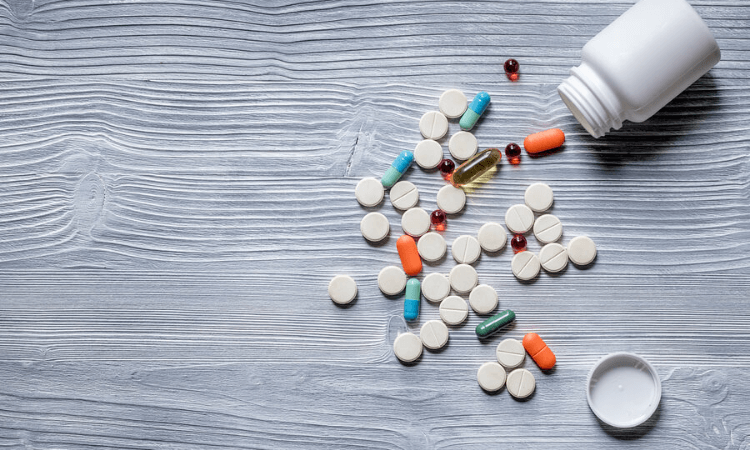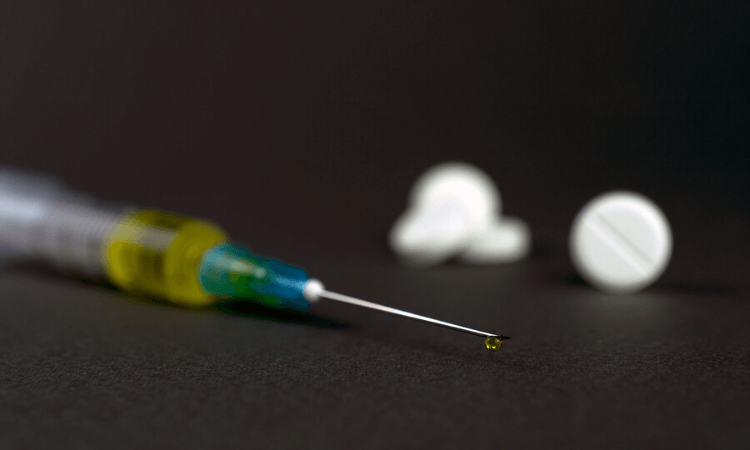
Pill Addiction – Pill addiction can occur as a person becomes dependent on prescription medication. This condition can happen unexpectedly, over time, due to regular use, or it can occur as a result of misuse. Taking too much of the medication too often or using the medication illegally without a prescription is considered abuse.
Continually using the drug over an extended period or increasing the dosage often leads to the development of tolerance. Tolerance is a physiological condition hallmarked by diminishing effects from the use of a drug, and the user gradually needing larger amounts to achieve the desired high.
In addition to tolerance, drug dependence occurs as the body adapts to a drug’s presence over time and gradually becomes unable to function normally without it. And, when the user tries to quit, highly unpleasant withdrawal symptoms onset as a result.
Once a pill addiction has fully developed, abuse becomes compulsive and difficult to overcome. Prescription drug addiction can result in severe long-term consequences, including physical injury and mental health disorders, and it can also affect interpersonal and professional relationships.
What Are Prescription Drugs?
Pill addiction can manifest from the abuse or misuse of any medication that cannot be lawfully sold without a prescription written by a licensed health provider. Because prescription drugs require a physician’s signature to obtain, they can be misused and abused in a few different ways, including the following:
- Obtaining them from a friend or family member who has a legitimate prescription
- Purchasing them illegally from a dealer or online
- Taking higher doses and/or more often than directed
- Doctor shopping—visiting multiple physicians or pharmacies in an attempt to obtain more drugs.
Commonly Abused Prescription Medications
Some prescription drugs are not misused or abused as frequently as others due to the sought-after effects of each drug. Medications that relieve pain or anxiety and/or induce euphoria are more likely to be abused than most others. Psychoactive prescription medications are classified in specific groups based on their properties.
Opioids
Opioids are prescription painkillers that bind to opioid receptors in the body’s central nervous system (CNS) and work to relieve pain.
Opioids are considered to have a high potential for abuse and addiction. For this reason, they require a prescription to use and are never included in over-the-counter products. Also, in response to the opioid epidemic and pressure to restrict opioid prescriptions, prescribers tend to limit many of these drugs and doses to just a few days, if possible.
Some of the most common opioid medications include the following:
- Hydromorphone (Dilaudid)
- Diphenoxylate (Lomotil)
- Hydrocodone (Norco, Vicodin)
- Morphine (MS Contin)
- Fentanyl (Duragesic)
- Codeine (Tylenol 3 and Tylenol 4)
- Oxycodone (OxyContin, Percocet)
- Methadone (Dolphine)
- Meperidine (Demerol)
- Propoxyphene (Darvon)
When used as directed by a doctor, opioids can be extremely effective at reducing pain. Their use can improve quality of life for those who experience acute or chronic pain, including following surgery, injuries, and during cancer treatment or palliative care.
However, tolerance and dependence on opioids can emerge rapidly, and pill addiction can form within just a couple of weeks of routine use. If a person increases a dose too much, he or she may encounter severe complications and be at high risk for profound respiratory depression, overdose, coma, and death.

Stimulants
Stimulant medications are usually prescribed to patients who experience attention-deficit hyperactivity disorder or obesity. They can boost energy and promote alertness, and also increase blood pressure and suppress appetite.
These stimulants are usually consumed orally in pill form, but some can be consumed orally as a liquid or administered by a transdermal patch. Stimulants vary on the length of time they are effective and include three categories: short-acting, intermediate-acting, and long-acting.
Among the most common short-acting stimulant medications include the following:
- Adderall
- Dexedrine
- Focalin
- ProCentra
- Ritalin
- Zenzedi
Intermediate-acting stimulants are effective for longer than those that are short-acting but still require a regular dosage to work properly. The most common of these include the following:
- Evekeo
- Metadate ER
- Methylin ER
- Ritalin SR
Long-acting stimulants do not usually require a regular dosage and can stay effective for hours, or even days while increasing alertness and attention. The most common of these include the following:
- Adzenys XR-ODT
- Adderall XR
- Concerta
- Daytrana
- Focalin XR
- Metadate CD
- Mydayis
- Quillivant XR
- Ritalin LA
- Vyvanse
Central Nervous System Depressants
Central nervous system (CNS) depressants reduce activity in the brain and body and include drugs in categories such as sedatives or tranquilizers. Most depressants work by regulating the release of the brain neurotransmitter gamma-aminobutyric acid (GABA).
GABA decreases brain activity, resulting in pleasant feelings of relaxation and drowsiness. Depressants are frequently prescribed to those suffering from anxiety and panic disorders or insomnia.
The most commonly prescribed CNS depressants include the following:
- Benzodiazepines (benzos)
- Non-benzodiazepine sleep medications
- Barbiturates
Some of the most commonly prescribed benzos are diazepam (Valium), clonazepam (Klonopin) and alprazolam (Xanax). These medications are often prescribed to treat extreme anxiety and panic attacks. If used long-term, however, some people will develop dependence, tolerance, and addiction.
Non-benzodiazepine insomnia medications include eszopiclone (Lunesta), zaleplon (Sonata) and zolpidem (Ambien). These medications act upon the same receptors as benzos but have a lower potential for dependence.
Barbiturates include drugs such as phenobarbital sodium (Luminal) and pentobarbital sodium (Nembutal), among others. These medications are prescribed less frequently than other sedatives due to a higher risk of overdose. They are sometimes still used to prevent seizures or for the treatment of alcohol withdrawal.

Antipsychotics
Antipsychotics are prescription medications that treat psychological disorders, such as bipolar disorder, schizophrenia, or Tourette’s syndrome. Common antipsychotics include haloperidol (Haldol), olanzapine (Zyprexa), quetiapine (Seroquel) and risperidone (Risperdal).
Other Pain Medications
There have been some reports of patients developing addictions to non-opioid pain medications, such as pregabalin (Lyrica) and gabapentin (Neurontin). These drugs are usually prescribed to treat painful conditions, such as neuropathy, fibromyalgia, and epilepsy.
Pill Addiction: Prescription Drug Abuse
Most pill addiction is the result of the use, misuse, or abuse of opioids, benzos, or stimulants. Some are more likely than others to develop an addiction, and this is related to several factors, including the following:
- Height, weight, and other personal characteristics
- Having a family history of substance abuse
- The drug they are currently using or abusing
- If he or she is treating a psychiatric condition or acute or chronic pain
- Past or current addictions to other substances
- Receiving peer pressure or living in an environment where drug use is accepted and/or lauded
- Having easy access to medications, such as having prescription drugs in the home
- Method of administration—crushing pills and snorting the remainder can accelerate addiction
Regardless of individual risk factors, anyone can become addicted to a prescription drug over time if they misuse the drug for a prolonged period. And, although there has been plenty of examples of people who have developed an addiction even when using the drug as prescribed by a doctor, this is much less common than as a result of some type of abuse.
Getting Treatment for Pill Addiction
Pill addiction can be detrimental to a person’s health and well-being to the point of becoming life-threatening. Those who suffer are strongly urged to seek treatment as soon as possible on an inpatient or intensive outpatient basis.
Recovery in Tune offers a comprehensive, research-based approach to addiction, comprised of vital therapeutic services, such as psychotherapy, counseling, psychoeducation, group support, and medication-assisted treatment. We provide clients with the tools, resources, and support they need to achieve abstinence and experience long-term sobriety and wellness.
If you are suffering from a pill addiction, contact us today. Discover how we can help you reclaim your life so you can begin to enjoy the happiness and harmony you deserve!